There’s this scene in the mini-series called The Buccaneers (based on the Edith Wharton novel), where Jacky is teaching the girls how the British Peerage works. It’s riveting, if only a minor bit of characterization, but it’s imprinted on my mind.
So when it came time to rewrite Victorian London to incorporate immortals, it’s possible I spent too much time on the peerage.
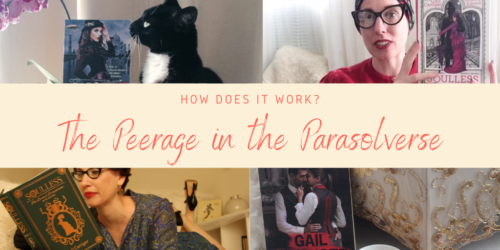
I’m not going to go deeply in the Order of Precedence, I trust you, Gentle Reader, can do that research yourself.
Parasolverse Peerage
I tend to circumvent the particulars in two ways: first most of my stories take place among the gentry not the peerage, and second most of my characters exist on a level of familiarity with one another that allows formalities to be less strict.
Here’s how I made mine work:
- The peerage pretty much works the same way it did historically. It includes the royal family, archbishops, dukes, earls, and viscounts, and technically stops at barons. A much younger son can be born into a noble family, but not inherit any title, thus being technically a commoner but still a member of the aristocracy.
- The nobility amongst human (AKA daylight) peers in my stories ALL inherit their titles, usually along with land. There are no “for life” high ranking titles granted to humans.
- The only granted peerages are to supernatural creatures. These are granted by the monarch to vampires queens (automatically) and to have-bound vampires or roves based on merit (usually for political service, great wealth, or significant aide rendered to the crown AKA spying). Peerages are granted to werewolf pack Alphas (automatically) or to pack members or loners based on merit (usually military heroes or civil service). For Alphas and queens, these grants include a title and land (for werewolves) or a title and house in a major city (for vampires). So Ivy, for example, becomes Baroness Tunstell (Timeless). Biffy becomes Lord Falmouth (Romancing the Werewolf). If in a werewolf pack, a challenge occurs that legitimately replaces one Alpha with another, the title transfers, since the title belongs more to the pack than the individual (as if going from human father to son upon death).
- Some supernatural creatures were also born human aristocrats or held peerage in a different land before they came to the UK. In those cases, the title transferred with them into immortality, Countess Nadasdy and Lord Akeldama, are examples of this kind of title. In such cases they do not take a new title unless they wish to.
- Only titled supernatural creatures are able to sit on the Shadow Council.
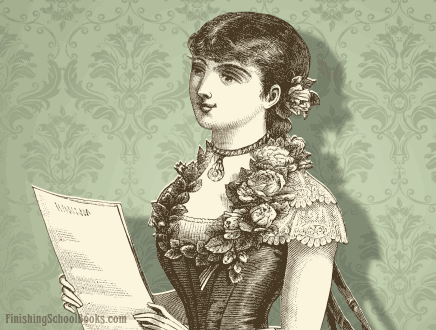
Parasolverse Gentry
- For daylight humans, below the peerage come the baronets and knights. These are more numerous and less influential.
- A baronage, in humans, is hereditary – like a peer.
- A knighthood, on the other hand, is conferred for life for services to the crown (see Sir Crispin in Defy or Defend). In the Parasolverse this is the only “for life” title granted to humans. Because of this, they never need to state “for life”. They are not peers and do not sit in the House of Lords. Knights are basically the upper gentry, along with squires, judges, and the like.
- Gentry might sit in the House of Commons, hold land (sometimes quite substantially), and are generally principal families of importance to a certain areas where the nobility is not particularly present. They act as magistrates and justices, fund the staking constabulary, support local charities and education, etc… Squire Loontwill is part of the gentry.
- The gentry are more active in rural areas, because the members of the peerage tend to spend a good portion of each year in London. (Which is still called “the Ton” in my Victorian world, even though that’s technically a Regency term.)
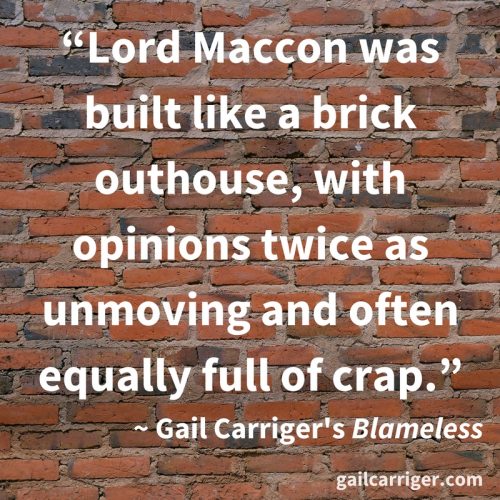
Lord Maccon
It is always a terrible inconvenience for the government when a member of the nobility, already holding, becomes either Alpha or vampire queen. However this is also very very rare. And then there’s Lord Maccon.
So Lord Maccon, in his original state was Alpha of Kingair. However, he was a true peer when he was changed. He would have been Conall Maccon, Laird of Kingair, variously called Lord Kingair, or just Kingair, or The Kingair. As he had children, mortal, before he changed into werewolf, his male heir would have inherited his peerage (the Laird title) at the point of his undeath, making his son Laird of Kingair, or Lord Kingair. This is why Conall would then be known as Lord Maccon instead (since he held the land but not the title).
- Eventually Sidheag is his only heir, so she is known as Lady Kingair.
- Alexia is then Lady Maccon, as his wife.
- Their daughter is Lady Prudence. (More on her to come.)
When Lord Maccon moves to London and successfully challenges the existing Alpha, Lord Woolsey, for ownership of the Woolsey Pack, he took on the title of Lord Woolsey and became the Earl of Woolsey. Successful werewolf challenge is recognized by the Crown as the wolf version of inheriting peerage. I know, confusing, but we’re talking the British aristocracy here mixed with my world building. However, Conall mainly prefers to go by his original title of Lord Maccon (possibly because of the negative associations of the Woolsey title brought about by the previous Alpha).
When the vampires take over Woolsey Castle and the wolves move to London, Countess Nadasdy should now be technically Countess Nadasdy, Lady Woolsey. Lord Maccon now has no proper holding, his territory is urban, he might be properly called Lord Maccon, Earl of London, although that is not legally possible. So he is now a peer without a holding, luckily he can keep going by just Lord Maccon.
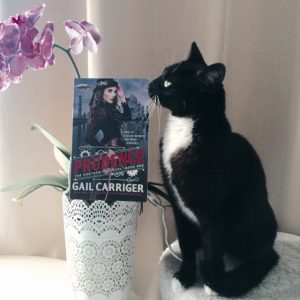
Prudence, adopted into Lord Akeldama’s household and title (and who knows where that comes from) is, by rights as adopted first born (so long as Lord Akeldama is truly considered a member of the daylight nobility) Lady Akeldama. However, to prevent being confused as his wife, she might chose to be referred to under her first name, as Lady Prudence (although we all know how much she hates that).
Since her very existence monkeys with the system you can see how the Queen might be annoyed by everything about her.
Bringing Up Commoners
Ivy, on the other hand, is brought up into the peerage as a commoner by virtue of becoming a vampire queen. She is granted a peerage as a baroness, and is now technically Lady Tunstell. Since this is not a daylight peerage, however, her children from her previous mortal life, Percy and Primrose, do NOT hold titles.
She is also given a territory by the crown, Wimbledon, so could be called (and might be in a kind of slang manner) the Baroness of Wimbledon. However she has no holding rights to that territory, she cannot collect rent, for example, so must earn her income, as most vampires do, through trade and investments.
One of the reasons I, as an author, transferred many of the existing hive with Ivy from Egypt is to give her a solid income and great trade ties to Alexandria, one of the biggest port cities at the time. Many of the English vampires also have their mitts in the East India Company, a very lucrative concern. This also explains how the East India company got so many concessions out of the British government, and why their nickname was Bloody Jack.
However, there is also the embarrassment of the drone/claviger process for consider.
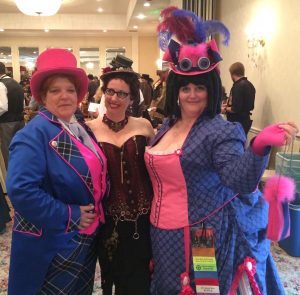
Gail with the Tunstells
Drones & Clavigers
Drones and clavigers are a carry-over from the guild-apprentice system. In both cases, if a young person is interested in immortality they technically petition to be indentured to a hive/rove or pack/loner. This is a kind of legalized servant/patron contract where the drone/claviger is bound to either the hive/pack or to the Alpha/Queen/Rove/Loner. Whether they belong to the group as a whole, or an individual alone is key – it’s like the difference between being a butler to a household or a valet to an individual.
Being bound to the Alpha, for example, ensures you will stay with him if he leaves his pack, it also means you serve him, like a valet. Tunstell is indentured to Conall specifically. Only Conall can release him from his contract. The servants in the hives, and most of the clavigers in the pack, are indentured to the household as a whole. They provide food to vampires, and safety and protection during full moon to werewolves (the name claviger means key-holder). In turn the supernatural creatures train them for various trades, education them in the ways of the immortal world, offer them patronage and money for their various artistic pursuits and, eventually offer them the option to try immortality (not all clavigers/drones are in it for the immortality).
You can see how, due to the servile nature of supernatural indenture, noblemen might dislike this part of the process and not want to try for immortality because of it? In fact, this is part of the reason it’s set up that way. Immortality is designed to bring up commoners into the aristocracy as vampires and werewolves, of which there are few made and who can’t produce children.
Still there are some who take the risk anyway, like Tizzy, for love, or money, or a chance at immortality. Or because of the liminal natural of the supernatural, that allows in my universe for a certain freedom of manner in the bedroom… shall we say?
Can I add how much I enjoy the term indenture when applied to werewolves and vampires? After all, the root of the word is “denture” teeth. Wanna know why?
“Identical copies if the contract were made on the same piece of paper; it was then torn along a jagged, toothlike (“dentures”) edge, leaving each party with a copy that – when fitted together with those other – would prove that it could only have been the counterpart of that one other piece of paper”
~ Daniel Pool p 325
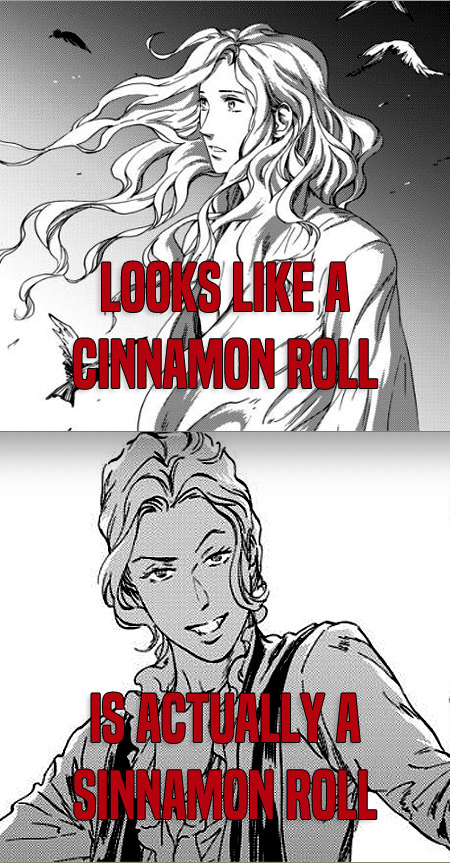
Which brings us to someone like Lord Akeldama – a rove.
He has indentures but clearly the contract is much less restrictive than a hive. His drones have a great deal more freedom. Perhaps this is because he must ally, politically, with a vampire queen to petition for his drones to be bitten? Perhaps because, as a rove, he himself has a great deal more freedom, his drones/vampire relationship is more relaxed and a less like servitude?
From a human looking to become immortal, this makes the choices of who you petition to become drone or claviger more complicated and a matter of weighing advantages and drawbacks of hive vs. rove, pack vs. loner, werewolf vs. vampire.
So there you have it, a very long blog post for today, I do hope that you have enjoyed it!
Here’s a few fun articles that might also interest:
- A Victorian marvel beneath the streets: Crystal Palace subway
- Thomas Cook’s Victorian Tours
- How To Make Nesselrode Cream The Victorian Way (video)
- Science is rekindling the lost aroma of Darjeeling tea
- Victorians weren’t killing themselves by wearing green dresses made with arsenic-based dye.
- The Victorian Era: a timeline of world history, and how it intersects with fashion history
Yours (destined to die on the alter of research),
Miss Gail
Find my books
Direct | Amazon | Kobo | Bookshop.org | B&N | Apple | Foyles | Angus Robertson
Here’s a printable Downloadable Checklist of ALL my books!
Did you miss my latest release?
Want more sneak peeks, free goodies, gossip, behind the scenes info?
This goes to my Chirrup members, because I love them bestest. Sign up here:
Not into newsletters? Get only new releases by following Gail on Goodreads, Amazon or BookBub!
BOOK DE JOUR!
Defy or Defend, a new Delightfully Deadly book featuring Dimity!
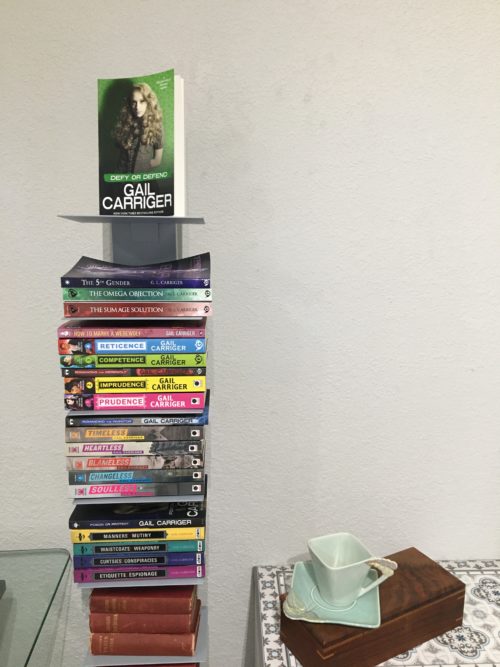
11+ Years of Work in One Picture
PICK YOUR VENDOR!
Direct from Gail
A vampire hive descending into madness. A beautiful spy with a sparkly plan. The bodyguard who must keep them from killing each other.
New York Times bestselling author Gail Carriger brings you a charming story of love, espionage, and Gothic makeovers set in her popular Parasolverse.
It’s a battle for survival… and wallpaper!
“…it was a delightfully light book I needed to remind me that I really do want to go reread Soulless and the Finishing School books and to wonder just which of my jewelry could be redesigned to be slightly more dangerous.”
Gail’s Daily Tea Party
Tisane of Nifty
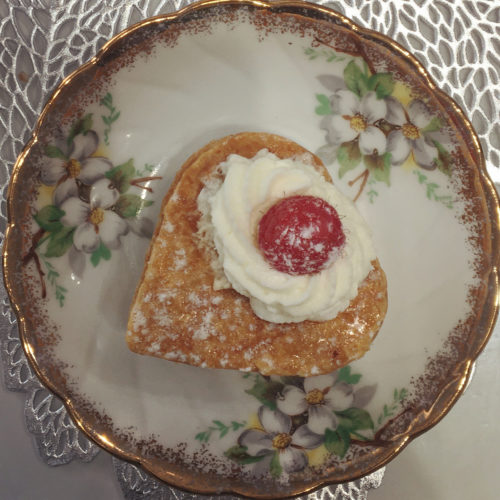
Book Nibble
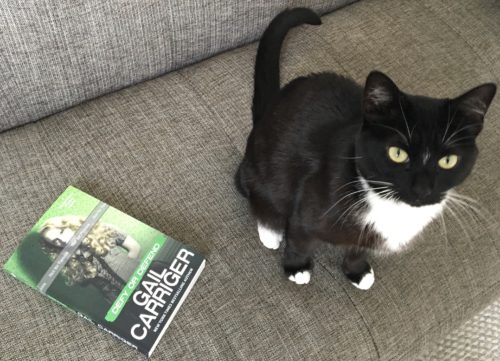
Quote to Sip
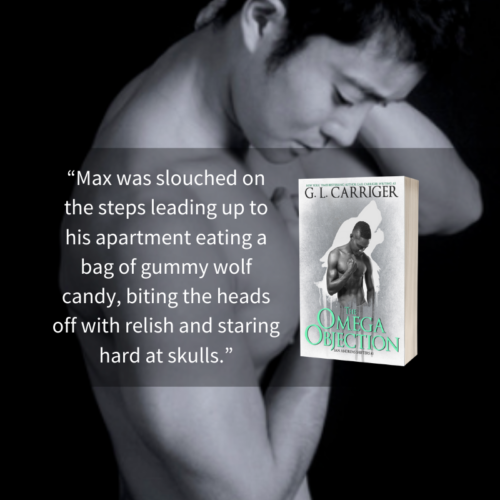

Very enlightening, though I feel a bit overwhelmed by all the information. No doubt it will sink in in time.
I do have one slightly pedantic question: is it really true that “The nobility amongst human (AKA daylight) peers in my stories ALL inherit their titles” or is this just a convenient simplification? As you know, in real history the peerage was regularly refreshed by new creations from the ample supply of war heroes, politicians the PM needed to assuage, royal favourites, etc. Of course all the new titles were heritable so this doesn’t change much (though it does stop the peerage gradually dying out).
YEs. AS I say, the “for life” titles, AKA made titles, are only granted to supernatural creatures. With the exception of knighthoods (but those are technically not part of the peerage).
This was a really interesting read! 😀
And this is unrelated to the post, but in regards to the Parasolverse’s extras, will you be releasing a design of the “Spotted Custard” in the future? Just got done reading “Meat Cute” on digital, and seeing Sorophonia involved in the story reminded me of the artwork of the Finishing School attended, and that it’d be cool to have one made for the “Spotted Custard” since it’s the only other dirigible named and used as a base of operations by Rue and company.
I might post my personal sketch at some point but I won’t be getting a professional schematic made. That was done by my publishing house and the Custard Protocol books didn’t sell well enough for them do release a special edition or go to that kind of expense.
I have a super fan who was trying to do one as part of an architecture course, but I don’t know if that ever happened. I might reach out to them and see if I can get a copy and post theirs.
Wow! That was a delightful amount of world building. I love how thought out you made it.
How would peerage work for newly discovered supernatural beings? I assume they’d have to barter with the Crown after being discovered (assuming they’re in British territory)? I think I remember some discussion of that happening when our Indian friends got discovered by Prue and Co. Our Peruvian Friends probably eventually be untitled once they settle in California? Is Peerage still generally ignored by Americans, I assume?
THANK YOU! this was something i always wondered about and having a huge dollop of information to scoff is wonderful
Hooray! So you’re the one I wrote it for!
I’ve always wondered what rank Lord Akeldama held. Clearly he is a least the equivalent of an Earl, as his daughter is Lady Prudence Akeldama. Any lower in the order of precedence and she would be the Honourable Prudence Akeldama (as with Kerry Greenwood’s late 1920’s Australian detective the Honourable Phryne Fisher). In fact I’d assumed she was Lady Prudence because her natural father was an Earl. Life Peerages are very much a 20th century innovation (so it’s entirely fitting for you to decide to not include them), and some of those awarded to WWI and WWII Admirals and Generals were inherited by sons.
Absolutely fascinating. I had no idea how interesting such technical information could be. Thanks for taking the time to write that for us!